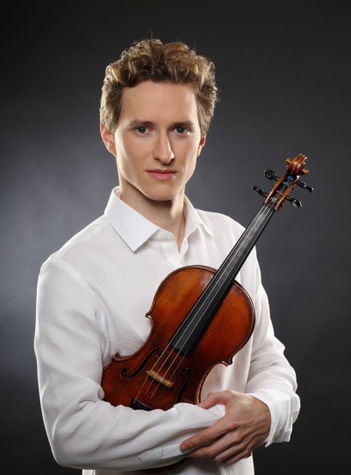Programme
Ludwig van Beethoven
Violin Concerto in D Major op. 61
A chamber orchestra composed of members of the Czech Philharmonic and the Karlovy Vary Symphony Orchestra performs Beethoven’s Violin Concerto under the direction of Josef Špaček. Špaček also appears as a soloist.
Ludwig van Beethoven
Violin Concerto in D Major op. 61
A chamber orchestra composed of members of the Czech Philharmonic and the Karlovy Vary Symphony Orchestra
Josef Špaček violin, artistic director

Ludwig van Beethoven’s (1770–1827) Violin Concerto places immense demands on musicians. Compared to Beethoven’s other compositions, it is an unusually lyrical piece in which the composer makes frequent use of pastoral motifs. Especially worth noting is the middle movement, Larghetto. The solo violin plays mainly in the upper registers, and the melodies are built on simple scale progressions or broken chords. The orchestra primarily plays the role of harmonic anchor, and in some places the pulse of the music nearly comes to a halt. Altogether, the impression is one of an intimate testament that, in the end, is interrupted by the playful virtuoso motif of the subsequent rondo movement.
Josef Špaček violin, guest artist

“Working with Josef Špaček is amazing. He is a wonderful person with good heart. You can feel this in his playing, which is gracious, teeming with emotion. And his technique is marvellous. He is one of the greatest solo violinists of the present time,” says the conductor Manfred Honeck, under whom the young virtuoso has regularly given concerts, in the Czech Television documentary Devět sezón (Nine Seasons) The 2023 film provides an interesting account of Špaček’s life, also shedding light on his nine-year tenure as the Czech Philharmonic’s concert master.
Although not having been a member for several years, Josef Špaček has not ceased to collaborate with the Czech Philharmonic, pursuing numerous joint projects. And even though appearing as a soloist with celebrated orchestras worldwide and as a chamber player at the most prestigious concert venues, he continues to perform in Czech towns and remote villages.
Josef Špaček is a member of the exciting international Trio Zimbalist, giving performances all over the globe. He has regularly appeared in the Czech Republic with the cellist Tomáš Jamník and the pianist Miroslav Sekera, with whom he has created critically acclaimed albums. He has also made recordings with the Czech Philharmonic (featuring Janáček’s and Dvořák’s violin concertos, and Suk’s Fantasy), the Prague Radio Symphony Orchestra, conducted by Petr Popelka (Bohuslav Martinů’s music).
Born in 1986 in Třebíč, Bohemia, Josef Špaček showed his exceptional talent at an early age. Music was a natural part of his childhood (his father has been a cellist of the Czech Philharmonic for over three decades, and his siblings played instruments too), as described by his mother in the book Špačci ve fraku. After graduating from the Prague Conservatory
(under the tutelage of Jaroslav Foltýn), Josef went on to study in the USA, where he attended the Curtis Institute of Music in Philadelphia (his teachers included Ida Kavafian and Jaime Laredo) and The Julliard School in New York (tutored by Itzak Perlman).
After completing his formal education, he returned to his homeland, where he was named the youngest ever concert master of the Czech Philharmonic. At the same time, he performed as a soloist and chamber player, garnering international recognition. A watershed in his career was victory at the Queen Elisabeth Competition in Brussels, whereupon he began receiving invitations from the world’s most renowned institutions. Due to his having an ever more challenging and busy schedule as a musician – and to his family situation, especially following the birth of three children – he resigned from the post of concert master of the Czech Philharmonic so as to focus solely on being a soloist. Owing to his immense talent and great diligence, his childhood dream to become a famous violinist has come to pass.